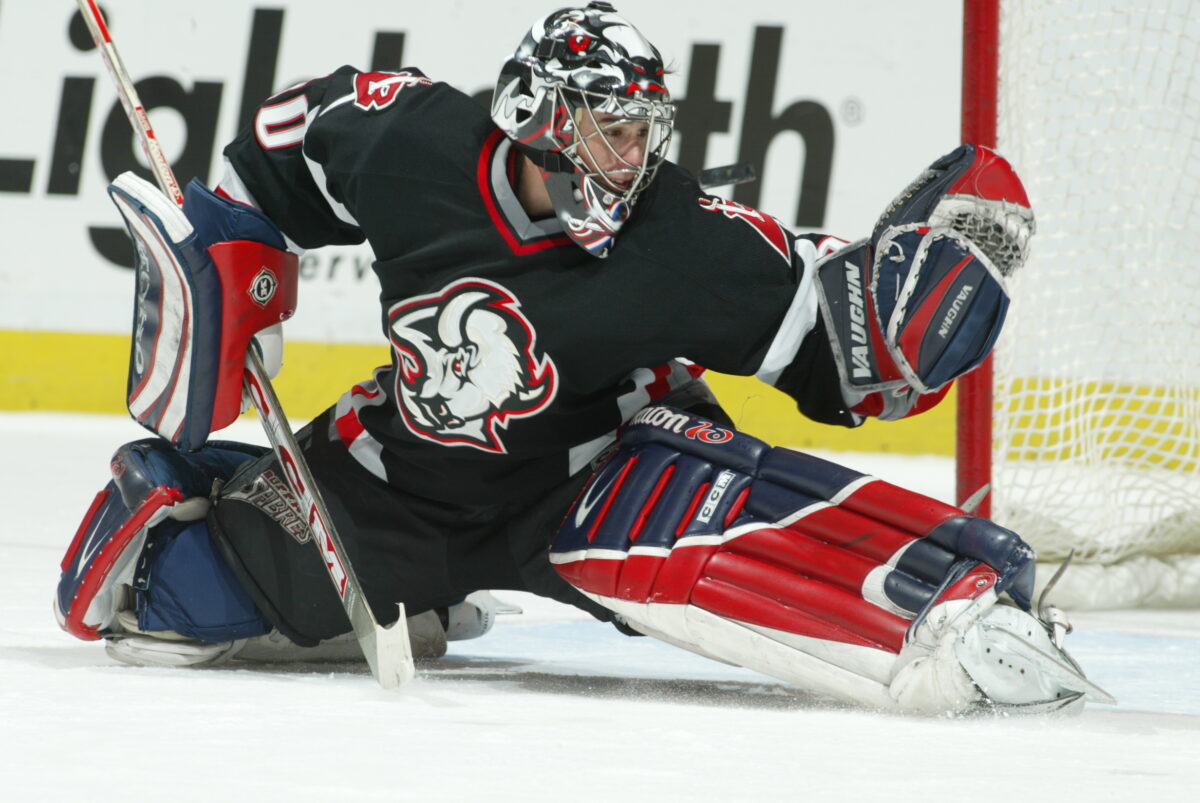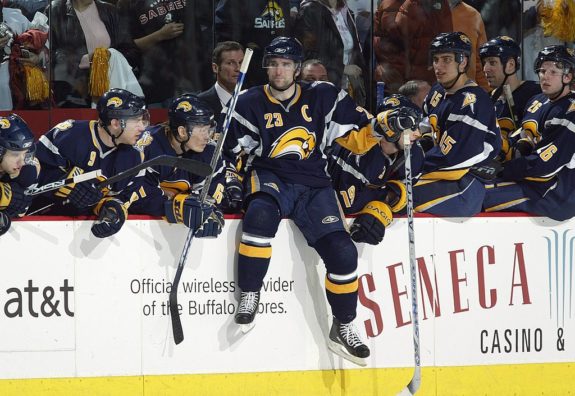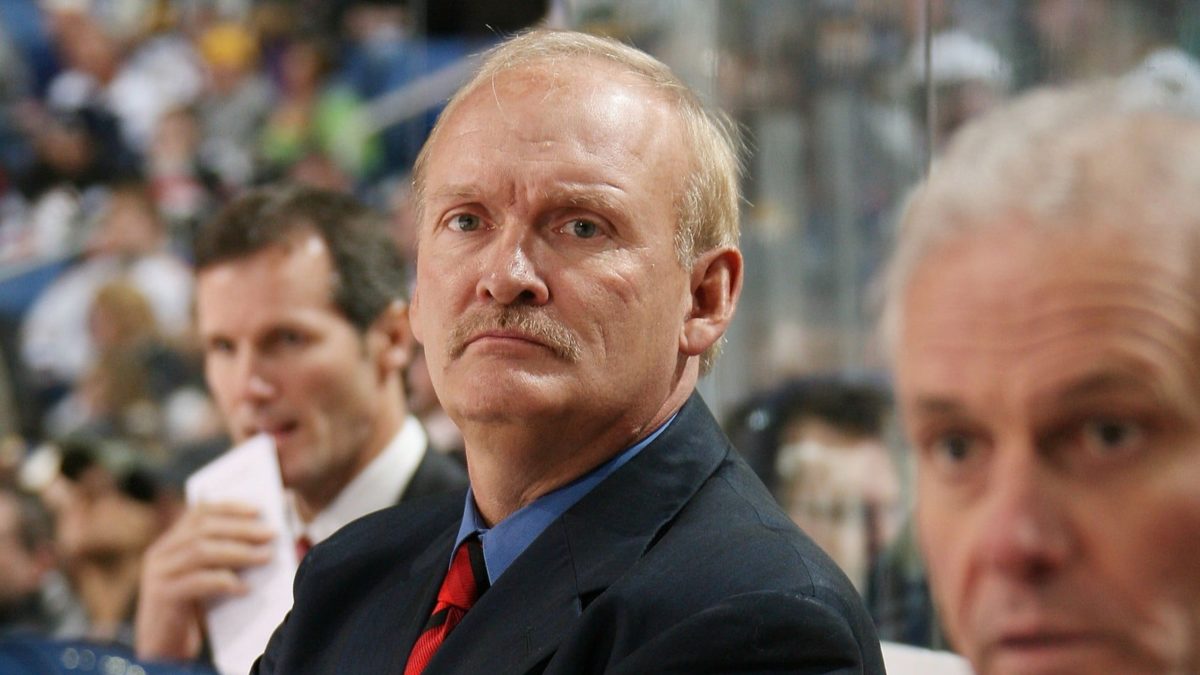As one of the NHL’s two oldest franchises without a Stanley Cup championship, it goes without saying that the Buffalo Sabres have had more than a few painful defeats in their 29 playoff appearances, including two in the Stanley Cup Final. Given this, it would be easy to assume that the team’s most heartbreaking defeat would be one of those two, right?
Not necessarily. Even if one of those defeats was the result of the most controversial play in NHL history, it’s far too easy to call “No Goal” the darkest moment in the team’s history. Instead, let’s dig a little bit deeper.
Almost every Sabres fan above a certain age remembers the team’s magical 2005-06 season. Unfortunately, they also remember just how devastating it was when it ended. Let’s review that 2006 Playoff run and why it was the saddest, most crushing blow in Buffalo Sabres’ history.
The 2005-06 Sabres Were Strong but Overlooked
Make no mistake about it, the 1999 Stanley Cup Final was a gut punch to Buffalo and remains a sore subject to this day. If not for the 2005-06 season, it would easily be the hardest loss that Sabres fans have ever had to endure. But it was outdone by the almost storybook run the 2005-06 team went on, and how it came to an end.
What’s important to understand is that coming out of the 2004-05 NHL Lockout, the Sabres weren’t expected to do a thing. Despite an improved 2003-04 season that seemed to suggest that better days were ahead, every sportswriter in hockey had head coach Lindy Ruff’s team booked for the basement in the fall of 2005. But there was one factor that they all forgot to account for.
The Sabres might have been the only team that actually benefited from the lockout. They had five young players in the American Hockey League (AHL) — Derek Roy, Thomas Vanek, Jason Pominville, Paul Gaustad and Ryan Miller — who were all ready to make the jump to the NHL for the 2004-05 season.

The cancellation gave them each a free extra year of minor league development, and all five benefited immensely. Adding the five to what remained of the Sabres’ core from the previous season gave the team a nearly perfect combination of youth and experience on its roster. Though it might have been difficult to foresee at the time, this gave the Sabres a major head start over other teams coming out of the lockout. While others were busy finding their footing after a year and a half away from each other, the Sabres knew they had something special and were ready to go out and prove the critics wrong. And boy did they.
“Now Do You Believe?”
With veteran co-captains Daniel Briere and Chris Drury leading the way, Buffalo took the hockey world by storm. After an inconsistent start to the season, the team won seven straight games in Dec. 2005 and never looked back, finishing fourth in the Eastern Conference with a 52-24-6 record and 110 points. Propelled by strong all-around offensive and defensive play that allowed Miller to establish himself as a franchise goaltender, the Sabres not only defied every expectation in the book, but looked good doing so. They won five or more games in a row on five separate occasions (including an eight-game streak in March 2006) and also set a franchise record with 25 road victories.

Though some pundits may have written it off as a fluke, the Sabres entered the 2006 Stanley Cup Playoffs and showed that it was no such thing, upsetting two heavily favored opponents in the Philadelphia Flyers and Ottawa Senators to advance to the Eastern Conference Final. The defining moment occurred in Game 5 of the second round.
With Jay McKee in the box for tripping in the first overtime period, Pominville picked up the puck in the Sabres’ zone and dashed to NHL history, curling around Senators’ legend Daniel Alfredsson and slamming it past goaltender Ray Emery to win the series for Buffalo. It was the first time a playoff series had been won on a shorthanded goal in overtime and was immortalized by Rick Jeanneret’s all-time greatest call.
These guys were indeed good, scary good. By advancing to the final four for the first time since 1999, the Sabres made everyone who doubted them look foolish. A trip to the Stanley Cup Final was within reach, the only obstacle was the Carolina Hurricanes.
Buffalo and Carolina Threw Everything at Each Other
The Hurricanes finished just two points ahead of the Sabres that year and the two teams proved to be every bit their equals, splitting the first four games. Game 5 at Raleigh’s then-RBC Center for some reason isn’t talked about much when the series is remembered, but it proved to be the turning point. The Sabres blew a 3-1 lead and lost in overtime on a goal by the Hurricanes’ Corey Stillman. It was the first time in the 2006 Playoffs that the Sabres looked vulnerable, and also the first time they faced elimination.
Despite this, the team did not falter and returned the favor in Game 6, winning on an overtime goal by Briere in front of an absolutely raucous crowd at Buffalo’s then-HSBC Arena to send the series to a seventh game. And though the believer’s bandwagon was running at full speed, the Sabres were about to fall victim to some of the worst luck ever seen in the sport.
Buffalo’s defensive corps entering the 2006 Playoffs was impressive, comprised of McKee, Teppo Numminen, Henrik Tallinder, Dmitri Kalinin, Brian Campbell and Toni Lydman. Throughout the playoffs, the top six would slowly be demolished by the most untimely outbreak of the injury bug the team has ever seen. In addition to losing leading power-play scorer Tim Connolly in the second round, Kalinin, Tallinder and Numminen also fell to the injured reserve, and the biggest blow came after Game 6 when McKee was sidelined by a severe leg infection. Seventh defenseman Rory Fitzpatrick and AHL call-ups Jeff Jillson, Doug Janik and Nathan Paestch were all forced to step in and play big roles.
A Heartbreaking Ending in Raleigh
The Sabres were not deterred by their sizeable injured list and fought valiantly in Game 7. A goal by Janik tied it at one late in the second period and they stunned the Hurricanes to take the lead with 3.3 seconds left when Jochen Hecht did his specialty and wrapped around behind the net, banking it in off goaltender Cam Ward.
Even with the four blueliners missing, the Sabres were on the cusp of what would have been the biggest miracle in team history, if they could just hold on for 20 more minutes. But in the third, the magic ran out.

The Hurricanes tied it at two early but the game remained close and the Sabres continued to show remarkable resilience. However, when Campbell inadvertently shot the puck over the glass from behind the Buffalo net and took a penalty, the clock struck midnight. It was a very unfortunate mishap for Campbell, who anchored the defense amidst all the injuries, and Rod Brind’Amour‘s ensuing power-play goal proved to be the game winner. Carolina added an empty-netter and took the contest 4-2 to advance to the Stanley Cup, which it would win over the Edmonton Oilers in a series that also went the distance.
Buffalo Is Left Wondering What If
The loss devastated Sabres fans everywhere and it was a extremely sour way for such a fun and unexpected ride to come to an end. Campbell, Lydman and Fitzpatrick shouldered the weight of the defense commendably while the three call-ups performed as well as anyone could have hoped. In the end, the injuries were simply too much to overcome. Nevertheless, the Sabres’ gallant effort earned them the respect of the hockey world and they gained a tiny measure of revenge on Carolina at the 2006 NHL Awards when Ruff beat out the Hurricanes’ Peter Laviolette for the Jack Adams Award as Coach of the Year.

In the 16 years since, the Sabres and their fans can only sit around and think about what might have been. Would this have been the team that finally brought the Stanley Cup to Western New York? Would the team have beaten Carolina if it hadn’t lost so many key players? Would they have gone on to win Game 7 had Campbell not accidentally shot the puck out? We will never know.
The 2006 Playoffs sting more than any other loss in Sabres history because it’s the greatest “what if” the team has ever had. Though we can ask the same question about “No Goal,” it’s two very different scenarios. Buffalo’s run to the Final in 1999 was both a Cinderella and David vs. Goliath story, as the gritty, ground and pound Sabres met the high-flying Presidents’ Trophy-winning Dallas Stars. While the 1999 Sabres were a better team than they received credit for and gave the Stars all they could handle, the odds were far less in their favor.
The 2006 Sabres, on the other hand, were strong from top to bottom and probably had the best chance at winning the Stanley Cup of any team in franchise history. It’s all too easy to blame injuries for losing in sports, but it is fair to say that the Carolina series might have ended differently had the Sabres not suffered as many setbacks as they did. Had even two of those four defenders stayed healthy, Drury and Briere may have raised Lord Stanley’s Chalice together.
Despite Losing, These Sabres Are Remembered Fondly
Many fans consider the 2005-06 Sabres to be the best incarnation of the team ever, and there is plenty of evidence to back that assertion. Not long removed from a dreadful three year stretch in which former owner John Rigas was convicted of fraud and the team nearly relocating as a result, the Sabres reignited hockey in Western New York that season and made believers of everyone in the process.
Related: Sabres Could Use Kane but the Cost Could Be Too High
Though they fell short of their ultimate goal, the 2005-06 Sabres are remembered as winners, even if history doesn’t reflect that. The team possessed the talent to win it all but couldn’t because of circumstances beyond their control. Because of that, they have a special place in the heart of every Buffalonian.